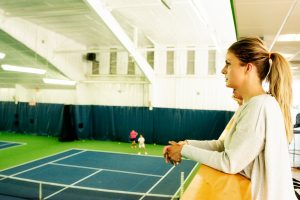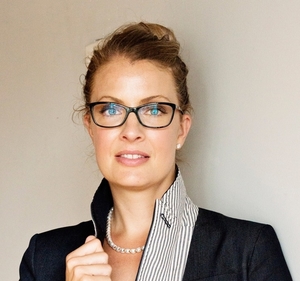
New York, NY—State University of New York (SUNY) College of Optometry alumna Anne Reuter-Hanna, OD, ’08, says a visit to the eye doctor as a college student-athlete not only improved her performance in the classroom and on the playing field—it opened her eyes to what would become her life’s work.
“I was a biochemistry major and a highly competitive soccer player at the University of Wisconsin. In my fourth year, I started to get headaches. Although I had near-perfect sight, it was my mother who suggested that I go to see the eye doctor because “Vision is more than just about 20/20,” recalls Dr. Reuter-Hanna, who was diagnosed with convergence excess, a condition where the eyes tend to aim inward during reading and close work.
“I went through a vision training program, and the first thing I noticed was that my game got better, then my academics improved, and my headaches went away. That’s when I knew I needed to do this for other people.”
Inspired by her patient experience, Dr. Reuter-Hanna began her professional journey into optometric practice by working as a vision therapist for the eye doctor who helped her. “After two years, I knew it wasn’t enough—I wanted to become a doctor. I asked what the best school for vision therapy is—and he said you want to go to SUNY.”
Improving Sight with Movement
Although she entered SUNY Optometry with interest in vision therapy, Dr. Reuter- Hanna found herself gravitating toward the disease aspect of optometry as well as research. After completing her training at the College, including rotations through the Brooklyn VA System, Dr. Hanna joined Lenox Hill Community Medical Group in Manhattan, where she developed advanced clinical expertise in diagnosing and managing ocular disease.

“I was exposed to complex cases and became highly skilled in diagnosing and treating a range of diseases,” says Dr. Reuter-Hanna, who has since published numerous articles in ocular disease and vision rehabilitation. “But I wanted to tap into my creativity, be innovative, and just do more.”
A few years later, a move out of New York prompted Dr. Reuter-Hanna to revisit her interest in vision therapy. She channeled her focus into developing and leading a program at the Brown Center in Providence, Rhode Island, in binocular vision and specialized in pediatrics, functional vision performance, and neuro-rehabilitation. She also became a professor of neuro-optometry, binocular vision, and neurological rehabilitation at Massachusetts College of Pharmacy and Health Science University.
“[The experience] gave me the opportunity to reevaluate my focus in optometry, it brought me back to why I entered the field in the first place.”
Today, Dr. Reuter-Hanna runs her private practice in Oyster Bay, New York, specializing in neuro-cognitive and athletic vision performance for athletes of all ages and skill levels, with a particular emphasis on helping amateurs become elite players. Her work includes serving as the exclusive sports vision doctor for the John McEnroe Tennis Academy in New York City and Long Island, working primarily with youth, and providing care for patients at the NYC Brain Injury Center. She also shares her time and expertise with charitable organizations and outreach programs that provide vision services to at-risk women and children.
“My practice provides comprehensive vision care that encompasses evaluation, correction, protection, and enhancement through lenses, prisms and vision training to improve athletic performance. These improvements translate into success in sports and better performance in areas such as school and work—as it did for me,” says Dr. Reuter-Hanna. “Athlete or not, I consider myself first, a primary eye doctor, who specializes in helping people to optimize vision and live life better.”
Strength Training for Your Eyes
Sports vision is a branch of optometry that offers specialized vision care services for athletes. It involves a comprehensive examination of the athlete’s ocular health, correction, assessment of visual function, protection, treatment of eye injuries, as well as a regimen of visual exercises to improve the visual skills necessary to excel in various sports.
“For a long time, sports performance focused on fitness. Then it was nutrition and sports psychology. Now we’re looking at what else we can change and understand that it all starts in the eye,” explains Dr. Reuter-Hanna. “We see mostly with our brain—an area that can be molded, changed, fortified, and enhanced to increase performance. It’s an obvious connection that is finally catching on.”
Depending on findings from a sports vision evaluation and the patient needs, contact lenses or glasses may be prescribed just for a particular sport. Eyewear may also improve distance vision or provide a tint to achieve better contrast on the field or court. Other patients may require vision devices or techniques to enhance visual-motor integration, that’s where sports vision training comes into play.
“A vision training program is tailored to the individual’s needs and sport,” explains Dr. Reuter-Hanna. “The goal is to optimize the brain’s ability to react to visual signals and improve eye-hand or body-eye coordination, balance, eye tracking, focusing, visual reaction time, dynamic visual acuity, peripheral vision, and the ability to respond appropriately to objects in motion – often when we, ourselves, are in motion.”
For example, most sports require a player to track a ball or puck and judge where it is in space. Without excellent eye tracking skills and depth perception, a player is at a disadvantage. Even the most elite players can elevate their game by honing these fundamental skills says Dr. Reuter-Hanna.
“And given that we’re all so focused and dependent on our computers and phones these days, there’s no doubt we can all benefit from taking a screen break and strengthening the eye-brain connection through vision training.”
To become a part of the SUNY Optometry alumni community, access the SUNY Eye Network at SunyEyeNetwork.org. For more about SUNY College of Optometry alumni, including 3,400 graduates across the nation and worldwide, visit sunyopt.edu/alumni.
###
September 24, 2021
Organization contact: Adrienne Stoller, communications@sunyopt.edu, 212-938-5600
About SUNY Optometry
Founded in 1971 and located in New York City, the State University of New York College of Optometry is a leader in education, research, and patient care, offering the Doctor of Optometry degree as well as MS and PhD degrees in vision science. The College conducts a robust program of basic, translational and clinical research and has 65 affiliated clinical training sites as well as an on-site clinic, the University Eye Center. SUNY Optometry is regionally accredited by the Commission on Higher Education of the Middle States Association of Colleges and Secondary Schools; its four-year professional degree program and residency programs are accredited by the Accreditation Council on Optometric Education of the American Optometric Association. All classrooms, research facilities and the University Eye Center, which is one of the largest optometric outpatient facilities in the nation, are located on 42nd Street in midtown Manhattan. To learn more about SUNY Optometry, visit www.sunyopt.edu.